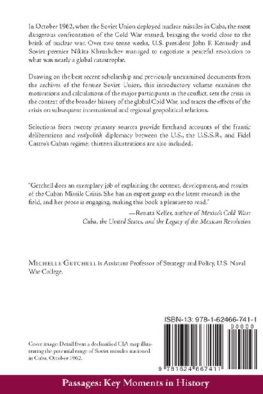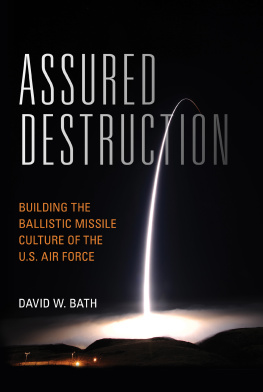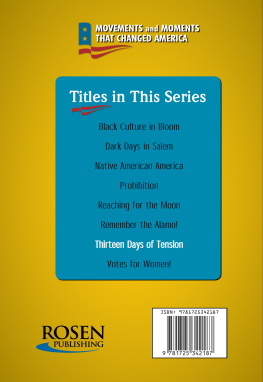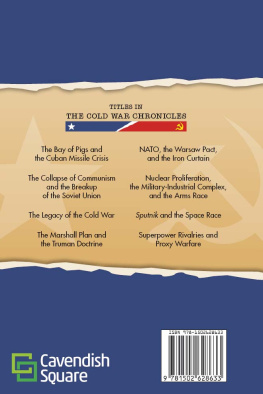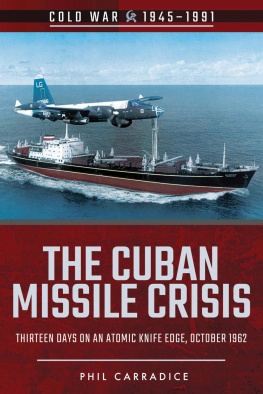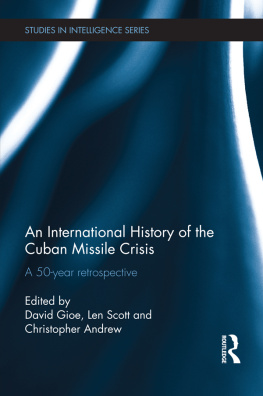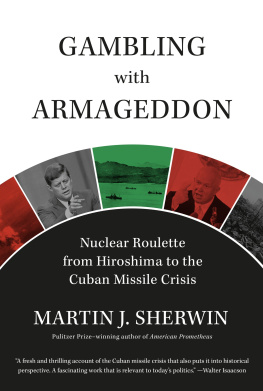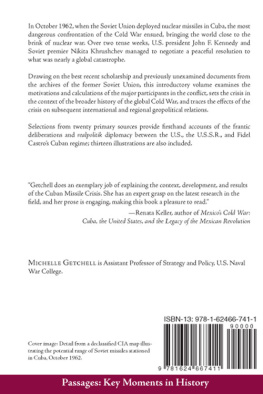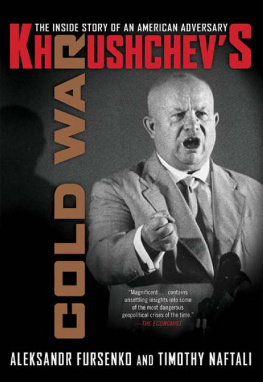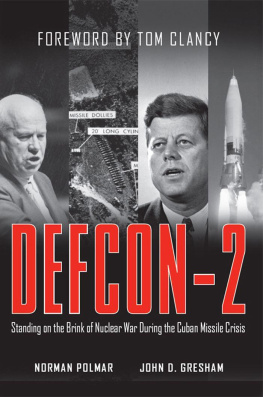Getchell Michelle - The Cuban Missile Crisis and the Cold War
Here you can read online Getchell Michelle - The Cuban Missile Crisis and the Cold War full text of the book (entire story) in english for free. Download pdf and epub, get meaning, cover and reviews about this ebook. year: 2018, publisher: Hackett Publishing Company, Incorporated, genre: Politics. Description of the work, (preface) as well as reviews are available. Best literature library LitArk.com created for fans of good reading and offers a wide selection of genres:
Romance novel
Science fiction
Adventure
Detective
Science
History
Home and family
Prose
Art
Politics
Computer
Non-fiction
Religion
Business
Children
Humor
Choose a favorite category and find really read worthwhile books. Enjoy immersion in the world of imagination, feel the emotions of the characters or learn something new for yourself, make an fascinating discovery.
- Book:The Cuban Missile Crisis and the Cold War
- Author:
- Publisher:Hackett Publishing Company, Incorporated
- Genre:
- Year:2018
- Rating:5 / 5
- Favourites:Add to favourites
- Your mark:
- 100
- 1
- 2
- 3
- 4
- 5
The Cuban Missile Crisis and the Cold War: summary, description and annotation
We offer to read an annotation, description, summary or preface (depends on what the author of the book "The Cuban Missile Crisis and the Cold War" wrote himself). If you haven't found the necessary information about the book — write in the comments, we will try to find it.
The Cuban Missile Crisis and the Cold War — read online for free the complete book (whole text) full work
Below is the text of the book, divided by pages. System saving the place of the last page read, allows you to conveniently read the book "The Cuban Missile Crisis and the Cold War" online for free, without having to search again every time where you left off. Put a bookmark, and you can go to the page where you finished reading at any time.
Font size:
Interval:
Bookmark:

{189}
Allison, Graham, and Philip Zelikow. Essence of Decision: Explaining the Cuban Missile Crisis , 2nd ed. New York: Longman, 1999.
Ameringer, Charles D. The Democratic Left in Exile: The Antidictatorial Struggle in the Caribbean, 19451959 . Coral Gables, FL: University of Miami Press, 1974.
Blight, James G., and Philip Brenner. Sad and Luminous Days: Cubas Struggle with the Superpowers after the Missile Crisis. Lanham, MD: Rowman & Littlefield, 2002.
Brands, Hal. Latin Americas Cold War. Cambridge, MA: Harvard University Press, 2010.
Castro, Fidel, and Ignacio Ramonet. My Life: A Spoken Autobiography. New York: Scribner, 2006.
Chang, Laurence, and Peter Kornbluh, eds. The Cuban Missile Crisis: A National Security Archive Documents Reader. New York: The New Press, 1992.
De la Cova, Antonio Rafael. The Moncada Attack: Birth of the Cuban Revolution. Columbus: University of South Carolina Press, 2007.
Dobbs, Michael. One Minute to Midnight: Kennedy, Khrushchev, and Castro on the Brink of Nuclear War. New York: Alfred A. Knopf, 2008.
Domnguez, Jorge I. To Make a World Safe for Revolution: Cubas Foreign Policy. Cambridge, MA: Harvard University Press, 1989.
Friedman, Jeremy. Shadow Cold War: The Sino-Soviet Competition for the Third World. Chapel Hill: University of North Carolina Press, 2015.
Fursenko, Aleksandr, and Timothy Naftali. Khrushchevs Cold War: The Inside Story of an American Adversary. New York: W. W. Norton, 2006.
. One Hell of a Gamble: The Secret History of the Cuban Missile Crisis. New York: W. W. Norton, 1997.
Gaddis, John Lewis. We Now Know: Rethinking Cold War History . New York: Oxford University Press, 1997.
Gleijeses, Piero. Visions of Freedom: Havana, Washington, Pretoria, and the Struggle for Southern Africa, 19761991 . Chapel Hill: University of North Carolina Press, 2016.
{190} . Conflicting Missions: Havana, Washington, and Africa, 19591976 . Chapel Hill: University of North Carolina Press, 2003.
. Shattered Hope: The Guatemalan Revolution and the United States, 19441954. Princeton, NJ: Princeton University Press, 1991.
Holloway, David. Stalin and the Bomb: The Soviet Union and Atomic Energy, 19391956. New Haven, CT: Yale University Press, 1994.
Leffler, Melvyn P. For the Soul of Mankind: The United States, the Soviet Union, and the Cold War. New York: Macmillan, 2007.
LeoGrande, William M., and Peter Kornbluh. Back Channel to Cuba: The Hidden History of Negotiations between Washington and Havana. Chapel Hill: University of North Carolina Press, 2015.
Mikoyan, Sergo. The Soviet Cuban Missile Crisis: Castro, Mikoyan, Kennedy, Khrushchev, and the Missiles of November. Washington, DC, and Stanford, CA: Woodrow Wilson Center Press and Stanford University Press, 2012.
Paterson, Thomas G. Contesting Castro: The United States and the Triumph of the Cuban Revolution. New York: Oxford University Press, 1994.
Pavlov, Yuri. Soviet-Cuban Alliance, 19591991. Coral Gables, FL: University of Miami North South Center, 1996.
Prez, Louis A., Jr. The War of 1898: The United States and Cuba in History and Historiography. Chapel Hill: University of North Carolina Press, 1998.
Rabe, Stephen G. The Most Dangerous Area in the World: John F. Kennedy Confronts Communist Revolution in Latin America. Chapel Hill: University of North Carolina Press, 1999.
. Eisenhower and Latin America: The Foreign Policy of Anticommunism. Chapel Hill: University of North Carolina Press, 1988.
Rasenberger, Jim. The Brilliant Disaster: JFK, Castro, and Americas Doomed Invasion of Cubas Bay of Pigs . New York: Scribner, 2012.
Schoultz, Lars. That Infernal Little Cuban Republic: The United States and the Cuban Revolution. Chapel Hill: University of North Carolina Press, 2009.
Westad, Odd Arne. The Global Cold War: Third World Interventions and the Making of Our Times. New York: Cambridge University Press, 2005.
Zubok, Vladislav M. A Failed Empire: The Soviet Union in the Cold War from Stalin to Gorbachev. Chapel Hill: University of North Carolina Press, 2007.
Zubok, Vladislav, and Constantine Pleshakov. Inside the Kremlins Cold War: From Stalin to Khrushchev. Cambridge, MA: Harvard University Press, 1996.
{124}
Memorandum for McGeorge Bundy from Arthur Schlesinger Jr., April 10, 1961
In this memorandum, penned a mere week before the launch of Brigade 2506, Arthur Schlesinger Jr., special aide to U.S. president John F. Kennedy, warns of the potential consequences of the Bay of Pigs invasion. He observes that many people do not view Cuba as a national security threat to the United States, and cautions that international public opinion will refuse to countenance calculated aggression against a small nation in defiance both of treaty obligations and of the international standards we have repeatedly asserted against the Communist world. Schlesingers predictions proved prescient; in this memo he anticipates almost exactly what the reaction would be after evidence of U.S. involvement in the invasion of Cuba surfaced.
A great many people simply do not at this moment see that Cuba presents so grave and compelling a threat to our national security as to justify a course of action which much of the world will interpret as calculated aggression against a small nation in defiance both of treaty obligations and of the international standards we have repeatedly asserted against the Communist world . To say that the Russians are doing worse in Laos is true but irrelevant, since we profess to be acting according to higher motives and higher principles than the Russians. Because the {125} alleged threat to our national security will not seem to many people great enough to justify so flagrant a violation of our professed principles, these people will assume that our action is provoked by a threat to something other than our security. Given the mythology of our relationship to Latin America, they will assume that we are acting, not to protect our safety, but to protect our property and investments. In short, for many people the easiest explanation of our action will be as a reversion to economic imperialism of the pre-World War I, Platt Amendment, big-stick, gunboat-diplomacy kind . The Communists will next seek to use the alleged U.S. initiative to bolster the Marxist interpretation of history. They will portray it as an effort on the part of the greatest capitalist nation to punish a small country for its desire to achieve political and economic independence. Throughout the underdeveloped world, they will try to persuade local nationalists to identify Castros cause with their own struggles. There will be particular emphasis on Castro as the defender of the colored races against white imperialism . The underdeveloped countries will be urged in the United Nations to defend their own future freedom of action by defending Castro; we can expect to be placed on the defensive in the U.N. for some time and to be subjected to a series of harassing debates and resolutions. Ex-colonial nations everywhere will be called on to identify their own problems with those of Castro.
State Department White Paper , April 1961
In this State Department White Paper, Latin American opinion of Fidel Castros Cuba is analyzed. According to State Department officials, members of several of Latin Americas moderate democratic political parties fretted about the military buildup in Cuba, which they claimed was converting a brother country into an instrument of the cold war. This document suggests that {126} even before the missile crisis, some progressive reformists in Latin America were concerned about the regional impact of the Cuban Revolution. The White Paper also details the growing Soviet military presence in Cuba.
Font size:
Interval:
Bookmark:
Similar books «The Cuban Missile Crisis and the Cold War»
Look at similar books to The Cuban Missile Crisis and the Cold War. We have selected literature similar in name and meaning in the hope of providing readers with more options to find new, interesting, not yet read works.
Discussion, reviews of the book The Cuban Missile Crisis and the Cold War and just readers' own opinions. Leave your comments, write what you think about the work, its meaning or the main characters. Specify what exactly you liked and what you didn't like, and why you think so.

